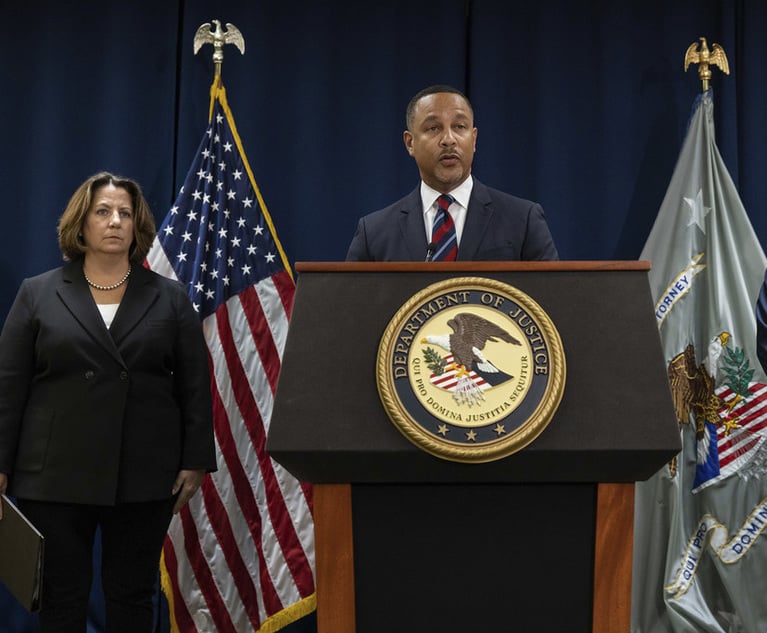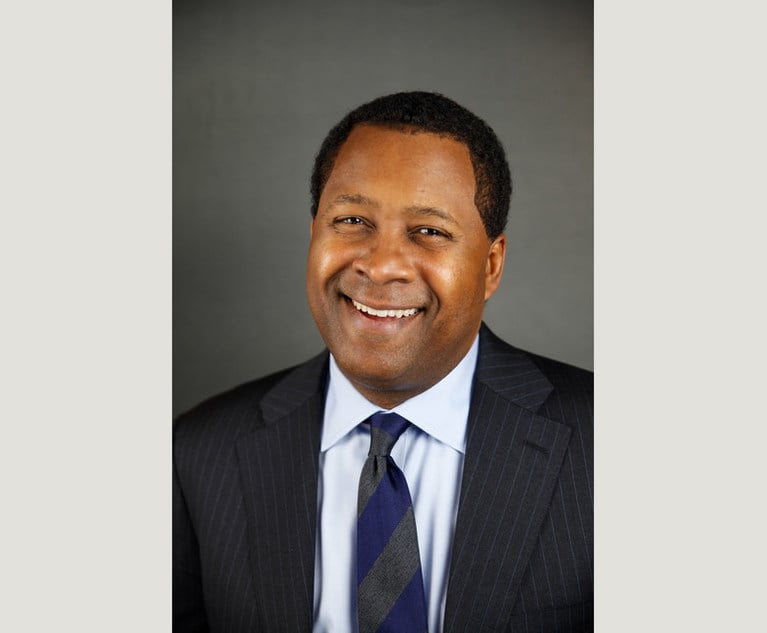Compliance Hot Spots: Clayton's Con Law Class | Beware the State AGs | Who Got the Work, and All the Moves
SEC Chairman Jay Clayton defends "no admit, no deny" settlements, state AGs are on the prowl, and scroll down for Who Got the Work. Thanks for reading!
December 11, 2018 at 09:00 PM
11 minute read
Welcome to Compliance Hot Spots, our weekly briefing on compliance, enforcement and government affairs. SEC Chair Jay Clayton's a fan of “no admit, no deny” settlements, which now and then come under fire in the courts. Here's looking at US District Judge Jed Rakoff in Manhattan. Scroll down for some big headlines that caught my eye—including some thoughts on state attorneys general. Plus: did you see Debevoise paid a client's civil penalty? Find out why below.
Thanks, always, for reading this newsletter—and your feedback is welcome. Send me your thoughts and predictions on 2019—any expectations for the new year? Contact me at [email protected] or 202-828-0315, and follow me on Twitter @cryanbarber.
'Didn't Know This Was Going To Be a Con-law Class'
Jay Clayton, chairman of the U.S. Securities and Exchange Commission, stepped into what he would later liken to a constitutional law class during a US Senate Banking Committee oversight hearing Tuesday.
Sen. Tom Cotton, R-Arkansas, a lawyer himself, asked Clayton about an element of the commission's enforcement regime that has long come under scrutiny: A 1972 rule demanding that parties that enter into settlements with the commission stay silent about the enforcement action. The policy is seen in standard settlement language stating that firms and individuals neither admit nor deny the alleged misconduct.
Cotton, pointing to a recent Wall Street Journal op-ed titled “How the SEC Silences Criticism,” asked what public interest the policy served. “The gag rule violates a hornbook's worth of legal doctrine: It is a prior restraint and a content-based restriction on speech. It serves no compelling government interest while employing the most restrictive means to accomplish its ends,” Peggy Little wrote in the op-ed. (Little is senior litigation counsel with the New Civil Liberties Alliance.)
Clayton stood by the SEC's longstanding approach, saying “if we can settle matters quickly, we can move on to look at other matters.”
“The 'no admit, no deny' approach has enabled us to get to settlements that get people their money back, get bad actors out of the marketplace and draw a line under that matter. So it has been an effective means of pursuing remedies,” Clayton said.
When Cotton asked whether Clayton believed the policy raised “First Amendment problems,” the SEC leader replied, “I think that we have a long history of people agreeing to restrict certain things that they can say in the commercial arena.”
“I didn't know this was going to be a con-law class.”
Compliance Reads: Stories That Caught My Eye
>> Who are the most feared regulators on block? State attorneys general, who “have expanded their roles in recent years to fill an enforcement void left by some federal agencies, and they are often joining together to form a multistate juggernaut of litigation,” my colleague Sue Reisinger reports on Law.com. California (that's AG Xavier Becerra above), New York and Massachusetts have “some of the most aggressive laws to give state attorneys general the most power, especially in consumer protection,” said Daniel Suvor, counsel in the Los Angeles office of O'Melveny & Myers. “Companies need to get smarter about ensuring they are compliant with state laws.”
>> New challenge to agency power: “The U.S. Supreme Court on Monday agreed to consider overturning a key precedent that has been the target of business groups and conservatives who want to weaken the authority of federal regulators.” [NLJ]
>> Deregulation's make-or-break year: “2019 could determine whether many of Mr. Trump's policies live beyond his presidency.” [WSJ]
>> Rinse and repeat: “Many of the same compliance issues that bedeviled credit unions in 2018 appear likely to continue to haunt them in the coming year. From cybersecurity and data security, to Bank Secrecy Act/Anti-Money Laundering efforts, and controversies over how to handle website compliance with the Americans with Disabilities Act, all remain unresolved.” [Credit Union Times]
>> Open investigation: “The Justice Department is investigating whether crimes were committed when potentially millions of people's identities were posted to the FCC's website without their permission, falsely attributing to them opinions about net neutrality rules.” [BuzzFeed]
>> A monitor's alert: “A monitor assigned to HSBC Holdings Plc told federal prosecutors about suspicious transactions linking Huawei Technologies Co. with Iran, adding evidence to a U.S. investigation that led to the arrest of the Chinese company's finance chief, according to a person familiar with the matter. The monitor, Exiger, was enlisted by the Justice Department to oversee HSBC's compliance efforts in 2013 following a $1.9 billion deferred-prosecution agreement with the bank that exposed a range of weaknesses in its internal controls. The London-based lender isn't under investigation in this matter, another person said.” [Bloomberg]
>> Skadden ties: “Lawyers and international trade experts in China see [U.S. Trade Representative Robert] Lighthizer's appointment as chief negotiator as an indication that the Trump administration is shifting to an even tougher position in China trade talks. Lighthizer is known to be much more hawkish toward China than Treasury Secretary Steven Mnuchin and Commerce Secretary Wilbur Ross, who previously led trade negotiations with China and came from the world of investment banking. [Law.com]
>> Wells Fargo woes: The asset cap imposed on Wells Fargo doesn't appear to be going anywhere soon. “The Federal Reserve has rejected Wells Fargo & Co's plans to prevent further consumer abuses and told the scandal-plagued lender it needs stronger checks on management,” Reuters reports. The Fed's concerns are expected to only lengthen the time it takes the central bank to lift an asset cap it imposed Wells Fargo following a string of scandals.
Who Got the Work
>> Debevoise & Plimpton partners Jeffrey Cunard, who manages the D.C. office, and Gary Kubek represented New York Knicks owner James Dolan of The Madison Square Garden Company in a Federal Trade Commission enforcement action in Washington. Dolan “violated federal law when he failed to tell government agencies of his acquisition of additional voting securities in the company,” according to The New York Times. A company spokesperson told the Times that Debevoise & Plimpton had missed a deadline and has “agreed to pay the fine as a result of their mistake.” The FTC's civil penalty was $609,000. Read the complaint here.
>> The agricultural company Agria was represented by Kirkland & Ellis partner Kenneth Lench as it put to rest allegations it used fraudulent accounting to conceal substantial losses. Agria agreed to pay $3 million to resolve the SEC's allegations and to cooperate with commission staff in future investigations. In a related action, Agria's executive chairman, Lai Guanglin, agreed to pay a $400,000 penalty to resolve claims he manipulated the company's stock price. Gaunglin, represented by Lorin Reisner of Paul, Weiss, Rifkind, Wharton & Garrison, also agreed to be barred for five years from serving as an officer or director of a publicly-traded company.
>> A team from Dechert LLP and Krieger Kim and Lewin lost at trial defending Chi Ping Patrick Ho, the head of a non-governmental organization based in Hong Kong and Virginia, against charges he schemed to bribe top officials of Chad and Uganda to win business advantages for a Chinese oil and gas company. Ho was convicted after a one-week trial in Manhattan federal court on four counts of violating the Foreign Corrupt Practices Act, along with related conspiracy counts. “Patrick Ho paid millions of dollars in bribes to the leaders of two African countries to secure contracts for a Chinese conglomerate,” Assistant Attorney General Brian Benczkowski, the head of the criminal division, said in a statement.
>> Three broker-dealers agreed Monday to pay a combined $6 million to resolve claims that they provided the Securities and Exchange Commission with incomplete and accurate trading information, which the agency uses for its enforcement and regulatory efforts. The firms Citadel Securities LLC, Natixis Securities Americas and MUFG Securities and Americas made so-called “blue sheet” submissions with incorrect and missing data, the SEC alleged. Citadel, represented by Davis, Polk & Wardwell partner Martine Beamon, was accused of submitting inaccurate information for nearly 80 million trades. MUFG was represented by Wilmer Cutler Pickering Hale and Dorr partner Bruce Newman, and Cahill Gordon & Reindel partner Herbert Washer, chair of the firm's litigation department, represented Natixis.
Notable Moves & Announcements
>> “Heath Tarbert, the Treasury Department's assistant secretary for international markets, is slated to be nominated by the White House as chairman of the U.S. Commodity Futures Trading Commission,” Politico reports. The former Allen & Overy partner was picked for a US Treasury post last year—we've got a link to his new-entrant financial disclosure, which shows client engagements with, among other financial institutions, Citigroup, JPMorgan Chase & Co., Danske Bank, Bank of America Corporation and Goldman Sachs Group. Tarbert's annual disclosure, showing his receipt of $1.3M in partner share, is here. Tarbert would succeed CFTC Chairman Chris Giancarlo.
>> Maureen Ohlhausen will become co-chair of the antitrust practice at Baker Botts effective January, the firm said. My colleague Ryan Lovelace has more on the announcement here. “Maureen has an exceptionally impressive background highlighted by her significant and influential recent tenure as Acting Chairman of the Federal Trade Commission and as a former Commissioner at the Federal Trade Commission,” said Andrew Baker, managing partner of Baker Botts.
>> Covington & Burling partner Terrell McSweeny, a former member of the Federal Trade Commission, is joining Georgetown Law's Institute for Technology Law & Policy as a distinguished fellow. McSweeny's role will include writing on antitrust and consumer protection issues. “I am thrilled to join the important discussion on technology law and policy at the Institute,” McSweeny said.
>> Jane Hinckley Halprin will serve as the Federal Communications Commission's administrative law judge. Halprin will replace Judge Richard Sippel, who retired on December 1. “Jane has done tremendous work at the FCC, and I congratulate her on this new role,” FCC Chairman Ajit Pai said. “The good judgment she displayed working on ethics issues at the agency for over a decade will serve her well as our administrative law judge.”
>> Andy Ewalt, former counsel to the director of litigation in the Justice Department's antitrust division, has joined Freshfields Bruckhaus Deringer as a partner in the firm's Washington office. His hiring follows the arrival of Eric Mahr, another antitrust veteran from the DOJ, in February. “Andy brings us invaluable insight and experience from his work at DOJ,” said Paul Yde, the U.S. head of Freshfields' antitrust, competition and trade practice.
>> “The Senate narrowly confirmed President Donald Trump's pick for the nation's top energy regulator, with Democrats voting en bloc against the nominee over concerns that he would use his position to promote fossil-fuel interests,” Bloomberg reports. “Bernard McNamee, a Republican Energy Department staffer who played a role in Energy Secretary Rick Perry's ill-fated plan to subsidize coal and nuclear plants, came under fresh fire when a video surfaced in which he equated the environmental movement with tyranny and criticized renewable energy.”
>> Jorge Castro, formerly of the Washington tax consulting firm Castro Strategies LLC, has joined Miller & Chevalier as a member of the firm's tax department. Castro earlier “served on the staff of senior Democratic members of both the Senate Committee on Finance and the House Committee on Ways and Means and as Counselor to the Commissioner of the Internal Revenue Service.”
This content has been archived. It is available through our partners, LexisNexis® and Bloomberg Law.
To view this content, please continue to their sites.
Not a Lexis Subscriber?
Subscribe Now
Not a Bloomberg Law Subscriber?
Subscribe Now
NOT FOR REPRINT
© 2025 ALM Global, LLC, All Rights Reserved. Request academic re-use from www.copyright.com. All other uses, submit a request to [email protected]. For more information visit Asset & Logo Licensing.
You Might Like
View All
Compliance Hot Spots: GOP Eyes ESG as an Antitrust Issue + Another DOJ Crypto Seizure + Sidley Partner Jumps to Main Justice
9 minute read
Compliance Hot Spots: Lessons from Lafarge + Fraud Section Chief Talks Compliance + Cravath Lands FTC Commissioner
11 minute readTrending Stories
- 1Mastering Litigation in New York’s Commercial Division Part V, Leave It to the Experts: Expert Discovery in the New York Commercial Division
- 2GOP-Led SEC Tightens Control Over Enforcement Investigations, Lawyers Say
- 3Transgender Care Fight Targets More Adults as Georgia, Other States Weigh Laws
- 4Roundup Special Master's Report Recommends Lead Counsel Get $0 in Common Benefit Fees
- 5Georgia Justices Urged to Revive Malpractice Suit Against Retired Barnes & Thornburg Atty
Who Got The Work
J. Brugh Lower of Gibbons has entered an appearance for industrial equipment supplier Devco Corporation in a pending trademark infringement lawsuit. The suit, accusing the defendant of selling knock-off Graco products, was filed Dec. 18 in New Jersey District Court by Rivkin Radler on behalf of Graco Inc. and Graco Minnesota. The case, assigned to U.S. District Judge Zahid N. Quraishi, is 3:24-cv-11294, Graco Inc. et al v. Devco Corporation.
Who Got The Work
Rebecca Maller-Stein and Kent A. Yalowitz of Arnold & Porter Kaye Scholer have entered their appearances for Hanaco Venture Capital and its executives, Lior Prosor and David Frankel, in a pending securities lawsuit. The action, filed on Dec. 24 in New York Southern District Court by Zell, Aron & Co. on behalf of Goldeneye Advisors, accuses the defendants of negligently and fraudulently managing the plaintiff's $1 million investment. The case, assigned to U.S. District Judge Vernon S. Broderick, is 1:24-cv-09918, Goldeneye Advisors, LLC v. Hanaco Venture Capital, Ltd. et al.
Who Got The Work
Attorneys from A&O Shearman has stepped in as defense counsel for Toronto-Dominion Bank and other defendants in a pending securities class action. The suit, filed Dec. 11 in New York Southern District Court by Bleichmar Fonti & Auld, accuses the defendants of concealing the bank's 'pervasive' deficiencies in regards to its compliance with the Bank Secrecy Act and the quality of its anti-money laundering controls. The case, assigned to U.S. District Judge Arun Subramanian, is 1:24-cv-09445, Gonzalez v. The Toronto-Dominion Bank et al.
Who Got The Work
Crown Castle International, a Pennsylvania company providing shared communications infrastructure, has turned to Luke D. Wolf of Gordon Rees Scully Mansukhani to fend off a pending breach-of-contract lawsuit. The court action, filed Nov. 25 in Michigan Eastern District Court by Hooper Hathaway PC on behalf of The Town Residences LLC, accuses Crown Castle of failing to transfer approximately $30,000 in utility payments from T-Mobile in breach of a roof-top lease and assignment agreement. The case, assigned to U.S. District Judge Susan K. Declercq, is 2:24-cv-13131, The Town Residences LLC v. T-Mobile US, Inc. et al.
Who Got The Work
Wilfred P. Coronato and Daniel M. Schwartz of McCarter & English have stepped in as defense counsel to Electrolux Home Products Inc. in a pending product liability lawsuit. The court action, filed Nov. 26 in New York Eastern District Court by Poulos Lopiccolo PC and Nagel Rice LLP on behalf of David Stern, alleges that the defendant's refrigerators’ drawers and shelving repeatedly break and fall apart within months after purchase. The case, assigned to U.S. District Judge Joan M. Azrack, is 2:24-cv-08204, Stern v. Electrolux Home Products, Inc.
Featured Firms
Law Offices of Gary Martin Hays & Associates, P.C.
(470) 294-1674
Law Offices of Mark E. Salomone
(857) 444-6468
Smith & Hassler
(713) 739-1250














